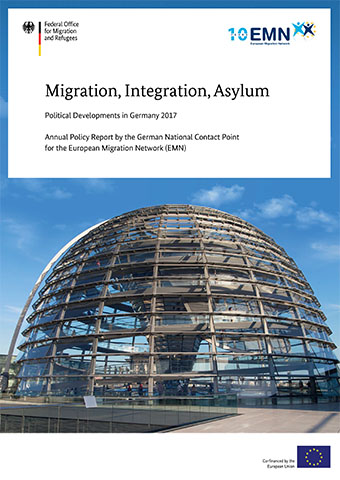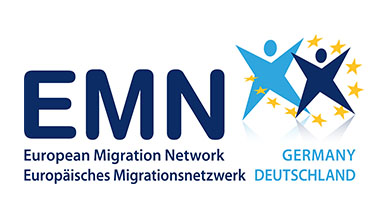Migration, Integration, Asylum - Policy Report 2017 ,
 Source: BAMF
Source: BAMF
The 2017 Policy Report of the German National Contact Point for the European Migration Network (EMN) provides an overview of the most important political debates and developments in the year 2017 in the areas legal migration, international protection and asylum, unaccompanied minors and other vulnerable persons, integration and anti discrimination measures, irregular migration, return, human trafficking and migration and development.
2017 saw several structural, legal and discursive changes in the area of migration and asylum. Amongst others, these were triggered by four Land elections (North Rhine Westphalia, Lower Saxony, Saarland and Schleswig Holstein) and in particular the Bundestag elections on 24 September 2017. Migration and aslum policy controversies played a major role during the election campaign and the coalition negotiations and were an important issue in the media as well.
The policy report traces a selection of these debates and goes into more detail on the following topics, among others:
Legal migration
The chapter on legal migration pictures developments in economic migration (e.g. Blue Card EU and the provisions for the western Balkan countries), family reunification, ethnic German repatriates, international students as well as the number of naturalizations. Moreover, visa liberalizations for Georgian and Ukrainian nationals are thematized.
Refugee migration and particularly vulnerable groups
Refugee migration declined considerably, while the Federal Office for Migration and Refugees further processed the backlog from the previous year and made decisions on more than 600,000 first-time and subsequent asylum applications. The overall protection rate dropped to 43.4%. Several legal changes entered into force in 2017. Now, asylum seekers whose application was rejected as manifestly unfounded may be ordered to remain in (initial) reception centres for up to 24 months. Furthermore, the Federal Interior Ministry ordered an early revocation examination of positive asylum decisions and the Federal Office for Migration and Refugees established three so-called Dublin centres.
Looking at particularly vulnerable groups, the number of asylum applications filed by unaccompanied minors declined. At the same time, an amendment to the legal provisions now obliges the youth welfare office to immediately file an asylum application on behalf of youths taken into care if the circumstances of the case justify the assumption that the child or youth is entitled to international protection. Several Länder have established new shelters for particularly vulnerable groups and minimum standards for the protection of handicapped refugees and LSBTTIQ refugees in refugee accommodation centres were published.
Integration und anti discrimination
In the field of integration, the number of integration and German language promotion course participants remains high. Some Länder offered additional alphabetisation courses and the Federal Office for Migration and Refugees initiated a nationwide, new integration course for second literacy learner. At the end of 2017, a new skills test called ‘MYSKILLS’ was implemented and also the EU Commission developed an ‘EU Skills Profile Tool for Third Country Nationals’.
Turning to anti discrimination measures, 2017 saw the adoption of the new ‘National Action Plan against Racism’, which calls for the protection of and solidarity with victims of racial discrimination, violence or other ideas of inequality as well as to promote measures against (institutional) racism. The Federal programme ‘Live Democracy! Active against Right wing Extremism, Violence and Hate’ was extended and complemented with several fields of action.
Irregular migration, return and human trafficking
In the field of irregular migration, human trafficking and border controls, the number of persons who were found to be illegally entering Germany during border traffic controls by the Federal Police dropped by 61%. The number of persons who are enforceably required to leave the territory, which includes persons whose removal is suspended, rose at the same time. At the European level, Germany deployed Federal Police officers on Frontex missions and the European naval operation Sophia against migrant smugglers. The Federal Foreign Office started the online information campaign ‘Rumours About Germany’, which aims, among other things, to refute rumours spread by migrant smugglers.
In the field of return policy a new assisted voluntary return programme ‘StarthilfePlus’ was implemented, the Federal Office for Migration and Refugees established a return hotline and all asylum applicants are provided with standardised return information at the branch offices of the Federal Office. The ‘Act to Improve the Enforcement of the Obligation to Leave the Country’ contains several changes in the areas of detention to secure removal, custody to secure departure, residence requirements for persons who are obliged to leave Germany and their electronic monitoring and the announcement of removals. In addition, the Repatriation Support Centre started work in March.
Since July, victims of human trafficking are no longer obliged to enforce damages against the perpetrators in court; it is sufficient if they raise and substantiate their claims.
Migration and development
The links between migration and development policy continued to strengthen in 2017. The German Society for International Cooperation (GIZ) alone implemented 100 projects in the field of flight and migration around the world in 2017. Since March 2017, the Federal Ministry for Economic Cooperation and Development (BMZ) has been developing its return programme ‘Returning to New Opportunities’, which is directed at persons who voluntarily return to their country of origin.
The 2017 Policy Report was authored as part of the European Migration Network (EMN).
The Policy Report was drawn up by: Janne Grote, Paula Hoffmeyer-Zlotnik, Anja Kuntscher, Julian Tangermann

